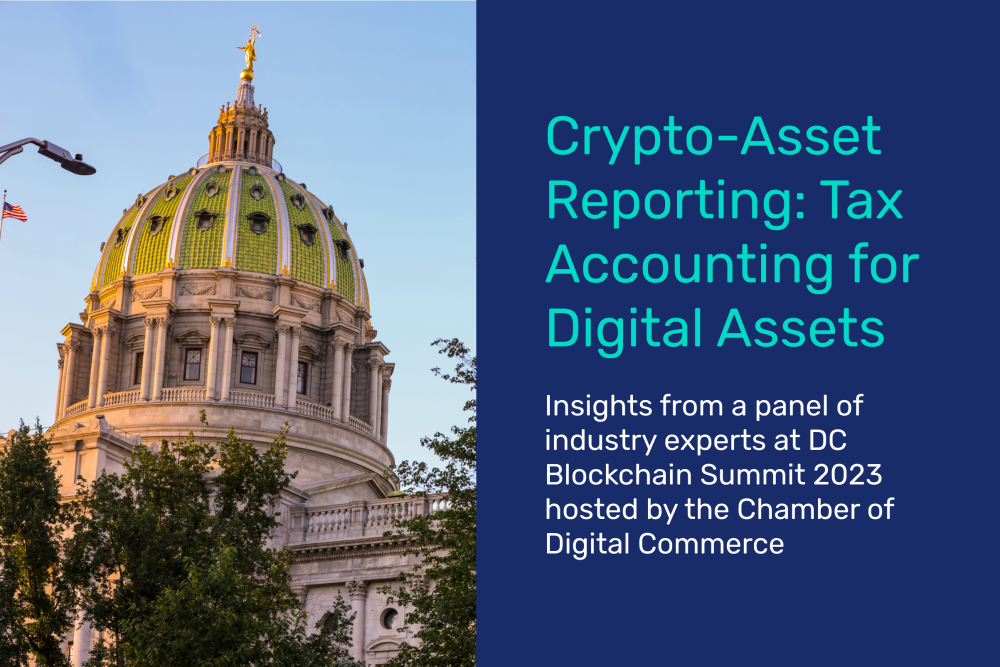Crypto-Asset Reporting: Tax Accounting for Digital Assets
Insights from a panel of industry experts at DC Blockchain Summit 2023 hosted by the Chamber of Digital Commerce

Published on:

TaxBit’s VP of Tax Solutions, Erin Fennimore, recently joined Julie A. Foerster (Project Director of Digital Assets at the IRS), Rob Massey (Global Tax Leader at Deloitte), Lisa Zarlenga (Chair of Tax Policy Group at Steptoe & Johnson LLP), and Cody Carbone (VP Policy at the Chamber of Digital Commerce) to discuss the past and future of crypto compliance.
Digital assets represent a powerful advancement in efficiency for a growing range of financial and non-financial transactions. Owing to their widespread influence and rapidly growing adoption in the U.S. and abroad, institutions are taking notice. However, a primary blocker for further adoption has been the ambiguous tax guidance for digital assets. This panel delved into the regulatory frameworks that can promote clarity for this rapidly-emerging asset class.
The Current Tax Treatment of Digital Assets
To open the discussion, the moderator Cody Carbone asked: “Julie, maybe you can set the scene for us before we get into this conversation. What are we really talking about here? What is the current tax treatment of digital assets?”
After noting that her views don’t necessarily represent that of the IRS, Julie A. Foerster responded: “...in 2014 the IRS issued a notice. And in that notice, it said that what you engage in this ecosystem is called virtual currency. Over the seven years, we have evolved, and it’s now called digital assets. So for most taxpayers, if you sell, you’ll have a gain or a loss. If you earn digital assets, or perform services, either as an employee or a contractor, you’ll have ordinary income.”
Crypto-Assets Are Not All Created Equal
Cody pressed further, “So, not all tokens are the same nor are all types of transactions. And in its simplest form, for federal tax purposes, virtual currency is treated as property. Rob, maybe you can help explain that to me, because many would say that it often feels a lot like money.”
Rob Massey then fielded the question: “Absolutely, and a lot has happened since 2014… We talk about digital assets now, and they come in lots of different flavors… How do we treat these transactions from a tax perspective? So, we have crypto used as a form of payment… And we have a series of barter transactions triggering gain or loss, or taking it as income, using it to pay expenses of employees, those are barter transactions.
All of these trigger gain or loss which is complicated, but we also have other types of digital assets. So we have to ask, ‘What are the rights and obligations of those digital assets attached to a holder?’ If it’s just being used as a medium of exchange that’s one thing, but what if it’s attached to a protocol? What if there’s a governance right that is granted technologically– and maybe the legalese is a bit grey, then what does that represent? …Or what about an NFT? …There are lots of different types out there, not all being equal, and a lot has happened since 2014.”
Good-Faith Reporting Amid Crypto Complexity
After Lisa built on Rob’s points on the nuance of different crypto-assets, Cody then reset the stage by asking, “...What are the key considerations for taxpayers when it comes to reporting digital asset transactions and how can they ensure compliance with the tax laws?”
Lisa answered: “I’d say the number one thing is to report. You may make mistakes, and that’s okay, but the digital asset transactions should be reported on your Schedule D or 8949… So all the transactions that you engaged in during the taxable year should be reported…” Lisa then went on to explain the recent major change to the Form 1040 that asks millions of Americans, front-and-center, whether or not they engaged with digital assets.

Rob then elaborated further on the immense complexity of crypto taxation, barter transactions, and keeping records of those transactions – ultimately leading the discussion to TaxBit’s Erin Fennimore. Erin proceeded to explain how difficult it is to fulfill the digital assets section of Form 1040:
“So, I think that I would pose the question: Does anyone do their taxes manually? We have wonderful advisors like Lisa or Rob telling us the ‘what’ but then how do you achieve the ‘how?’ It’s extremely complex to prepare your own taxes without crypto involved, and then you add in crypto – extremely complex data.... Manually calculating that and then reporting that forward on a tax return is nearly impossible. So you take the ‘what’ and you productize it in the ‘how’ on the TaxBit side of things. We’re trying to facilitate that ability to accurately report forward when you are investing in crypto.”
Cody then interceded: “Let’s change gears a little bit and move to the regulatory developments in taxation. We are in Washington, after all, and we do have a regulator on stage… How has the regulatory landscape shifted over the last few years?”
Key Signs of Regulatory Clarity from the IRS
Erin answered: “So over the last few years, which I think everyone in the audience knows something about, we have the IIJA but from the IRS we haven’t seen a ton of regulation. We’ve been waiting with bated breath for the coordinating 6045 regs… But we have started to see actions from the IRS that tell us they’re listening to the industry… and they understand clarifying and issuing. Whether it’s informal or formal guidance is very important across the industry for many different reasons. So, as Julie mentioned, we’ve seen the shift from virtual currency to digital assets, which is a coordinating effort with other regulators. We’ve also seen two pieces just since January of this year…
The IRS clarified that crypto donations over $5,000 need a valuation. Now, while that clarification is wonderful, it probably also raises other questions about how you’re going to value certain cryptocurrencies, things like NFTs, because that information is not always readily available. The second clarification was on the ‘What can you deduct when your token loses all of its value?’ …Today, we even have more movement with the issuance of 2023-27 which touches on NFTs.”
Julie then adds more clarity to Erin’s points: “Very exciting news today, not regulation, but it is the notice and its treatment of NFTs as collectibles. And what I want to reiterate and state, you’ve heard it today, and it’s collaboration with all of us. We are listening at the IRS. We do want to hear from you, and this notice is evidence of that. It is a notice period of 90 days. And there are certain questions in there and I would venture to say there may be more that we haven’t thought of.
So, please take the time to let us hear from you so that we can get this right. I think it’s imperative in this space that we get it right and we as an agency cannot do it without all of us… We can’t do it without you all. And so I will say, just a little plug for my office. I am the arm of the Project Director of a small but big office where we are working in collaboration with you and the industry, with our partners in the private sector. Certainly, with software computations within our own agency, it’s a very exciting time. But to get it right, we need your help.”
To view the full panel discussion, check out the Vimeo link here at the 6:50:00 mark


